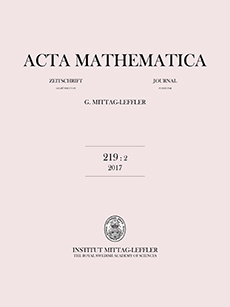Alexander D. Scott, Alan D. Sokal
Acta Math. 213 (2), 323-392, (2014) DOI: 10.1007/s11511-014-0121-6

KEYWORDS: complete monotonicity, positivity, inverse power, fractional power, polynomial, spanning-tree polynomial, basis generating polynomial, elementary symmetric polynomial, matrixtree theorem, determinant, quadratic form, half-plane property, Hurwitz stability, Rayleigh property, Bernstein–Hausdorff–Widder theorem, Laplace transform, harmonic analysis, symmetric cone, Euclidean Jordan algebra, Gindikin–Wallach set, 05C31 (Primary), 05A15, 05A20, 05B35, 05C05, 05C50, 05E99, 15A15, 15B33, 15B57, 17C99, 26A48, 26B25, 26C05, 32A99, 43A85, 44A10, 60C05, 82B20 (Secondary)
We prove the complete monotonicity on for suitable inverse powers of the spanning-tree polynomials of graphs and, more generally, of the basis generating polynomials of certain classes of matroids. This generalizes a result of Szegő and answers, among other things, a long-standing question of Lewy and Askey concerning the positivity of Taylor coefficients for certain rational functions. Our proofs are based on two ab-initio methods for proving that is completely monotone on a convex cone C: the determinantal method and the quadratic-form method. These methods are closely connected with harmonic analysis on Euclidean Jordan algebras (or equivalently on symmetric cones). We furthermore have a variety of constructions that, given such polynomials, can create other ones with the same property: among these are algebraic analogues of the matroid operations of deletion, contraction, direct sum, parallel connection, series connection and 2-sum. The complete monotonicity of for some can be viewed as a strong quantitative version of the half-plane property (Hurwitz stability) for P, and is also related to the Rayleigh property for matroids.

